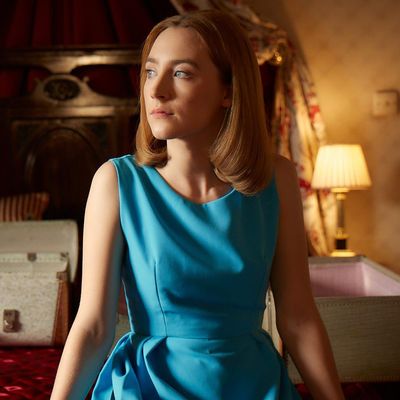
This post contains spoilers for On Chesil Beach, both the book and the movie.
As both the book and the film versions of On Chesil Beach remind us, the pair of doomed lovers at the center of the tale are each a product of their times. It’s Britain in the early ’60s, which means that, as Ian McEwan’s opening puts it, Florence (played in the movie by Saoirse Ronan) and Edward (Dunkirk’s Billy Howle) were “young, educated, and both virgins on this, their wedding night, and they lived in a time when a conversation about sexual difficulties was plainly impossible.” Edward’s unreconstructed ideas about sex mean he cannot conceive of a world in which he’s not entitled to his wife’s body; Florence’s strangled emotions mean she cannot express her lack of desire until it’s far too late.
The movie mostly sticks faithfully to the book’s omniscient narrative, as faithfully as a movie can without resorting to voice-over narration. (McEwan wrote the script.) Instead, it’s told in a series of flashbacks, often in long scenes detailing the early days of Florence and Edward’s relationship. But there are shorter ones too, which come in brief flashes, and there’s one near the end that sticks out. As the couple is embarking on their pivotal, terrible wedding-night sex, we flash back to one of Florence’s childhood trips on her father’s boat, which we’ve seen before. Except this time, there’s something new — her father undressing behind her, as young Florence cowers in the foreground. Suddenly, her total aversion to sex has a clear explanation.
At the moment, this struck me as a dramatic departure from the novel, which to my memory had no sexual-abuse subplot. I wasn’t quite sure what to make of it. It seemed a bit psychologically overdetermined to me; I preferred the book’s ambiguity, or the possibility that Florence was simply asexual.
But it had been years since I read the book, and when I read, I tend to read more for speed than for detail. (Like The Hobbit, On Chesil Beach is the rare film adaptation that takes longer to watch than the book does to read; I devoured it in a single afternoon.) So, true to the movie’s vibe, I had my own moment of minor embarrassment when a few minutes’ research revealed that what seemed like a new addition to Florence’s backstory had in fact been part of the narrative the whole time.
Savvier readers than I, like Dave at the Reading Bug, picked up the clues. Throughout the book, Florence’s memories often flash back to solo trips with her father when she was young, “just the two of them, hiking in the Alps, Sierra Nevada and Pyrenees, and the special treats, the one-night business trips to European cities where she and Geoffrey always stayed in the grandest hotels.” (Note the odd use of his first name, and the absence of Florence’s mother.)
These memories get particularly sharp when Florence and Edward are about to have sex. Her brain conjures up memories her father’s yacht — flashes of images floating toward the surface, and then pushed back down again:
Here came the past, anyway, the indistinct past. It was the smell of the sea that summoned it. She was twelve years old, lying still like this, waiting, shivering in the narrow bunk with polished mahogany sides. Her mind was blank, she felt she was in disgrace. After a two-day crossing, they were once more in the calm of Carteret harbour, south of Cherbourg. It was late in the evening, and her father was moving about the dim cramped cabin, undressing, like Edward now. She remembered the rustle of the clothes, the clink of a belt unfastened or of keys and or loose change. Her only task was to keep her eyes closed and to think of a tune she liked. Or any tune. She remembered the sweet scent of almost rotten food in the closed air of a boat after a rough trip. She was usually sick many times on the crossing, and of no use to her father as a sailor, and that surely was the source of her shame.
Assembled together in this form, all the hints seem quite clear, though they are of course easier to miss when they’re scattered throughout even a short book. It’s an interesting illustration of the differences between page and screen: The movie’s flashback doesn’t give us any information that we didn’t also get in the book version, but for me at least, there’s something about seeing it that spells it out much more plainly.
But if you completely missed it too, don’t be too hard on yourself. McEwan’s early drafts reportedly included much more about Florence’s father’s true nature, but he cut almost all of it. “In the final draft, it’s there as a shadowy fact for readers to make of it what they will,” he’s said. “Many readers will miss it altogether, which is fine.”


